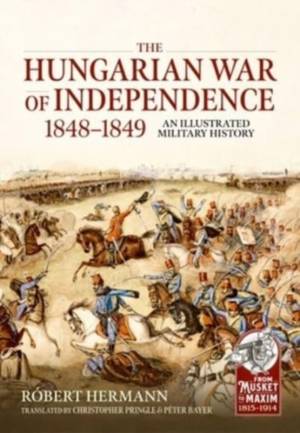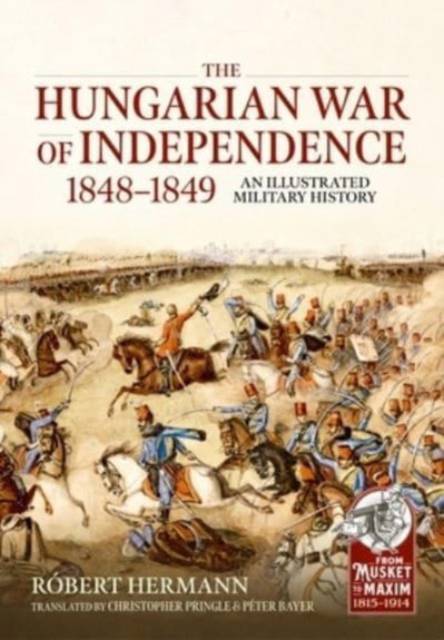
- Afhalen na 1 uur in een winkel met voorraad
- Gratis thuislevering in België vanaf € 30
- Ruim aanbod met 7 miljoen producten
- Afhalen na 1 uur in een winkel met voorraad
- Gratis thuislevering in België vanaf € 30
- Ruim aanbod met 7 miljoen producten
Zoeken
€ 52,45
+ 104 punten
Omschrijving
An overview of the Hungarian Revolution and War of Independence (1848-1849) and details the struggle for national autonomy against the Habsburg Empire and Russian intervention.
The story of the Hungarian revolution and war of independence of 1848-1849 is one of the most important series of events in the history of Hungary. During these 18 months, the country takes its most significant steps to transition from a feudal system to a civic society. All of this happened as part of a wider European revolutionary process in which Hungarian and international events were in constant interaction. The movement towards German and Italian unity, the attempt to create a unified Poland, and the efforts to federalize the Habsburg Empire all influenced developments within Hungary and vice versa.
The revolution and war of independence was an experience shared by the entire population. Hundreds of thousands served in the military and the national guard, attended hustings and elections, endured the difficulties caused by the movements of armies, and suffered the horrors of war. Some of the actors - generals and private soldiers, ministers and deputies, priests and civilians - saw fit to record their experiences.
The country was unable to execute the above transition peacefully and was forced to take up arms to defend its achievements. The imperial court of Vienna could not tolerate Hungary, the largest territorial component of the Habsburg Empire, becoming a political entity in its own right. It first attempted to use the country's ethnic minorities' nationalist movements to pressure Hungarian politicians to give up their autonomy over domestic Hungarian legislation. On 11 September 1848, Josip Jelačic, the Ban [viceroy] of Croatia and Lieutenant General in Imperial Royal Army launched an armed intervention against Hungary - with the secret support of Vienna - and from mid-October much of the Imperial Royal army stationed in the country turned against the Hungarian government. Until April 1849 the war was one of self-defense. At that point, in response to the Imposed March Constitution ordained by Austria, the Hungarian national assembly declared the country's independence and the dethronement of the House of Habsburg. With that, the war of self-defense was transformed into a war of independence, which Austria was only able to win by asking for military assistance from the Tsar of Russia. Uniquely in contemporary European military history, suppressing the revolution required the combined strength of two great powers. Other than the First Schleswig-Holstein War, this was the longest-lasting armed conflict of the years 1848-1849, with the last Hungarian stronghold of Komárom capitulating in early October 1849.
This book presents a complete overview of the process as well as its individual components. The reader will be guided through not only the battlefields, but also the Ministry of War, the field hospitals, and the arsenals. The reader will learn about the composition and tactics of the opposing armies, and about the conflict's heroes, be they famous figures or unknown soldiers.
The story of the Hungarian revolution and war of independence of 1848-1849 is one of the most important series of events in the history of Hungary. During these 18 months, the country takes its most significant steps to transition from a feudal system to a civic society. All of this happened as part of a wider European revolutionary process in which Hungarian and international events were in constant interaction. The movement towards German and Italian unity, the attempt to create a unified Poland, and the efforts to federalize the Habsburg Empire all influenced developments within Hungary and vice versa.
The revolution and war of independence was an experience shared by the entire population. Hundreds of thousands served in the military and the national guard, attended hustings and elections, endured the difficulties caused by the movements of armies, and suffered the horrors of war. Some of the actors - generals and private soldiers, ministers and deputies, priests and civilians - saw fit to record their experiences.
The country was unable to execute the above transition peacefully and was forced to take up arms to defend its achievements. The imperial court of Vienna could not tolerate Hungary, the largest territorial component of the Habsburg Empire, becoming a political entity in its own right. It first attempted to use the country's ethnic minorities' nationalist movements to pressure Hungarian politicians to give up their autonomy over domestic Hungarian legislation. On 11 September 1848, Josip Jelačic, the Ban [viceroy] of Croatia and Lieutenant General in Imperial Royal Army launched an armed intervention against Hungary - with the secret support of Vienna - and from mid-October much of the Imperial Royal army stationed in the country turned against the Hungarian government. Until April 1849 the war was one of self-defense. At that point, in response to the Imposed March Constitution ordained by Austria, the Hungarian national assembly declared the country's independence and the dethronement of the House of Habsburg. With that, the war of self-defense was transformed into a war of independence, which Austria was only able to win by asking for military assistance from the Tsar of Russia. Uniquely in contemporary European military history, suppressing the revolution required the combined strength of two great powers. Other than the First Schleswig-Holstein War, this was the longest-lasting armed conflict of the years 1848-1849, with the last Hungarian stronghold of Komárom capitulating in early October 1849.
This book presents a complete overview of the process as well as its individual components. The reader will be guided through not only the battlefields, but also the Ministry of War, the field hospitals, and the arsenals. The reader will learn about the composition and tactics of the opposing armies, and about the conflict's heroes, be they famous figures or unknown soldiers.
Specificaties
Betrokkenen
- Auteur(s):
- Vertaler(s):
- Uitgeverij:
Inhoud
- Aantal bladzijden:
- 444
- Taal:
- Engels
- Reeks:
Eigenschappen
- Productcode (EAN):
- 9781804511831
- Verschijningsdatum:
- 31/08/2025
- Uitvoering:
- Paperback
- Formaat:
- Trade paperback (VS)
- Afmetingen:
- 170 mm x 244 mm

Alleen bij Standaard Boekhandel
+ 104 punten op je klantenkaart van Standaard Boekhandel
Beoordelingen
We publiceren alleen reviews die voldoen aan de voorwaarden voor reviews. Bekijk onze voorwaarden voor reviews.











